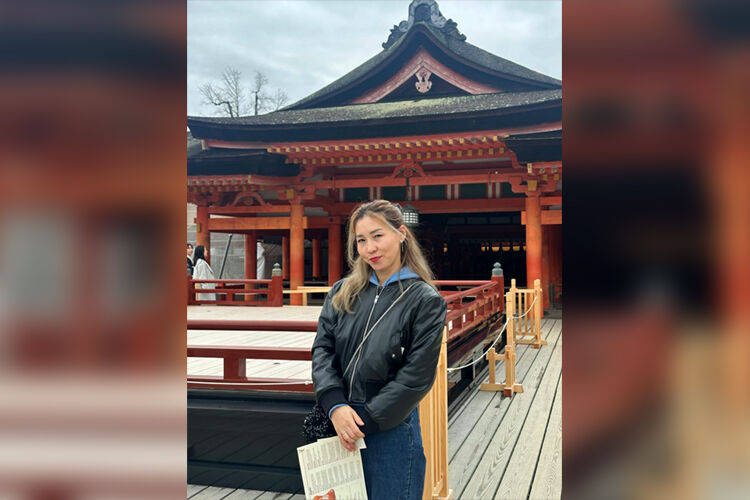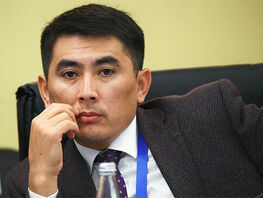Aiperi Namazbekova is a lawyer by profession. She worked in court for a long time, then at the Bishkek City Hall in the department of expertise and decision-making. In the fall of 2024, she moved to Japan to pursue a master’s degree at Hiroshima University.
She shared her experiences of studying and living in the Land of the Rising Sun with 24-kg.com news agency.
— How did you choose a place to study?
— Every year, the Cabinet of Ministers of Kyrgyzstan, in cooperation with the government of Japan, sends 19 public and municipal employees to Japanese universities for master’s degrees under the JDS program.
Kyrgyzstanis study here for two years, then return home and apply their experience in their work. The key requirements are: high-level English proficiency, at least two years of public service, and a research topic closely aligned with the applicant’s current job, so they can later help improve a specific sector. Japanese universities must also be interested in the applicants and their research topics.
— Was the selection process difficult?
— I was told that many people apply two or three times. I got in on my first try. I think that was thanks to the support of a colleague who had previously studied in Japan. She guided me through the whole process — advised me on my motivation letter and essay, pointed out shortcomings, and advised me on what could be improved and corrected.
— One of the pressing issues in Bishkek is parking. My research is currently focused on finding solutions to this problem. I was told right away that the topic was vast and cannot be researched and all the data collected in two years, so I needed to narrow my focus as much as possible.
I’m now focused on the impact of hourly parking fees on driver behavior and the effectiveness of multi-level parking lots.
— Will hourly parking help relieve traffic congestion?
— In the course of my research, I have to read a lot of literature and study various experiences.
For example, in Japan, Europe, and China, money is the deciding factor. High parking costs help to relieve traffic congestion to some extent, but I still need to research the percentage ratio and other aspects.
In some countries, the parking fees vary depending on occupancy: the fewer free spaces, the higher the rate. For example, in an area with 10 parking spaces, during rush hour, the fee can rise to 500 soms or more, to the extent that two spaces always remain free. A driver seeing such a high rate might choose not to park. If 3–5 spaces are available, the fee goes down. I doubt this model would work in Kyrgyzstan — we have a different mindset.
In Japan, there is both a fixed hourly rate and a dynamic rate. Parking here is expensive, but cars are not. Therefore, before buying a car, Japanese people always consider where they will park it. If there is no parking, they buy a moped or bicycle or use public transport. Of course, many people buy a car when they have a family and children.
— What method could be used in Bishkek?— Recently, a parking fee of 50 soms plus 10 soms for each hour was introduced. I think this is a reasonable fee that will help to partially relieve traffic congestion, at least in the central part of the city.
Take Shopokov Street, for example. Employees of nearby shopping centers come to work and leave their cars there for the day. If the cost of parking is high, people will think twice about whether to drive or start looking for other options — maybe even carpooling with a neighbor or colleague on a rotating basis.
In some countries, office workers «compete» for parking spots. Priority is given to those with longer tenure or who’ve contributed more to the company. Newcomers commute by public transport. Perhaps we’ll reach that point too, but we need to develop our public transportation. Bishkek is heavily built-up; I remember we even looked into preliminary calculations for building a metro system.
To be honest, my professor believes that there are no parking problems in Bishkek, we just need effective administration. For example, a small area can be used to build a parking lot for 3-6 cars, but few people want to do this.
— In certain places, yes — especially when spaces are assigned to specific individuals, such as in front of ministries, government agencies, or residential buildings.
In Japan, every square meter matters. If there’s only space for two cars, then two- or three-tier parking lots are provided for such cases. This is something we can adopt, especially in our microdistricts, to free up playgrounds and green areas from parked cars.
— How do you find the Japanese way of life?
— It’s very safe here. You could leave your wallet somewhere and no one would touch it. People are polite, helpful, and always willing to lend a hand.
Those who come to Japan on their own often complain about bureaucracy — you can’t even buy a SIM card without registration. Some people have trouble renting apartments — they might be denied simply because the landlord didn’t like them.
Our experience was smoother since the program acts as a guarantor and provides support. We rent housing using the scholarship, which covers basic living expenses — though there’s not much left for travel or leisure. According to the program’s rules, we’re not allowed to work part-time.
To live in a developed country, you have to work constantly. Japan is no exception — if you don’t pay your rent on time, you’ll be evicted. If you miss utility payments, you’ll be charged penalties, and gas or water can be shut off. Eventually, that damages your reputation as a tenant.
It’s easier in Kyrgyzstan. I remember when I first started working in the civil service, the salary was small. Sometimes I had only 200 soms left in my pocket, but I could still get by. You can always find some side job. Here, even if you have 10,000 yen left (about 6,000 soms), you start to feel anxious.
— Do you like the local cuisine?
— Many people say Japanese food is delicious. Personally, I’ve noticed you can eat a lot but never feel full — there’s no real feeling of satiety. One time I decided to bake bread (the bread here is too sweet and too soft for my taste), I bought flour, but even the flour turned out to be sweet.
Fruits and vegetables are very expensive and the variety is limited — people buy them one or two at a time, not by the kilogram or sack like in Kyrgyzstan. Meat is also expensive. Although, in general, you can find everything if you have money.
Eating out is very common in Japan. There are affordable cafés where people have breakfast before work and dinner after. In fact, buying ready-made meals is sometimes cheaper than cooking at home. Plus, you don’t have to clean the kitchen or spend time cooking.
Japanese food is generally healthy, but to be honest, I don’t find it very tasty.
— The toilets are a separate topic! They’re clean everywhere, with heated seats and all sorts of functions.
The culture of instructions. It seems to me that a Japanese person won’t start working without a step-by-step guide. If you need to go somewhere, just follow the line or the signs — that’s how it works. We, the Kyrgyz, are used to looking for shortcuts, but that just doesn’t work here.
There are almost no benches on the streets — everything is clearly zoned: streets are for movement, parks are for rest.
Aiperi Namazbekova
There are no public garbage bins except at large metro stations. Waste is sorted — and you get used to it, because there’s simply no other option.
Landlord sometimes checks the bins and points out mistakes. For example, plastic bottles should be thrown away separately from their caps; unclear trash goes into burnable waste; recyclable materials — in a different bag. They say there are fines for improper sorting. In any case, the landlord monitors this carefully and tries to avoid penalties.
Queues are everywhere. The Japanese love queues. Usually, they are kind and gentle people, but when it comes to waiting in line, they become a bit strict. In stores, they might even refuse to serve someone who skipped the line — a gentle way of teaching people discipline.
Discipline in kindergartens and schools is strict, but in university, students enjoy the freedom of personal expression. What is good about the Japanese school program is that students have the opportunity to visit different cities in the country. This is also available to university students.
— What do you do in your free time?
— In big cities like Tokyo and Osaka, there are Kyrgyz communities, and there’s more entertainment. Hiroshima is a quiet city, with fewer options for leisure. The streets are empty after 10 p.m. Cafés have only three or four tables. I am a sociable person, so it was difficult at first. Sometimes you feel very lonely.
There are six Kyrgyzstanis in Hiroshima, and they all came with their families — the JDS program allows that. I came alone. So in that sense, it’s a bit boring. But there are always international groups — people from different countries come together.
I would like to express my sincere gratitude to the organizers of Kyrgyzstan Day at Expo 2025. Everything was done at a high level — brightly, with dignity, and heartily. They showed the best of our culture, traditions and people.
It so happened that I was sitting next to some Japanese people during the performances and, to be honest, I was amazed. I heard so many different «sugoi» (which means «great» or «amazing») that I was genuinely surprised. The Japanese are usually reserved and not particularly emotional, but this time, their admiration was sincere and clearly visible.
— What are your plans for the near future?
— I will complete my master’s degree in 2026 and return to Kyrgyzstan with a set of parking-related recommendations for Bishkek. I hope I can contribute to solving this issue.






















